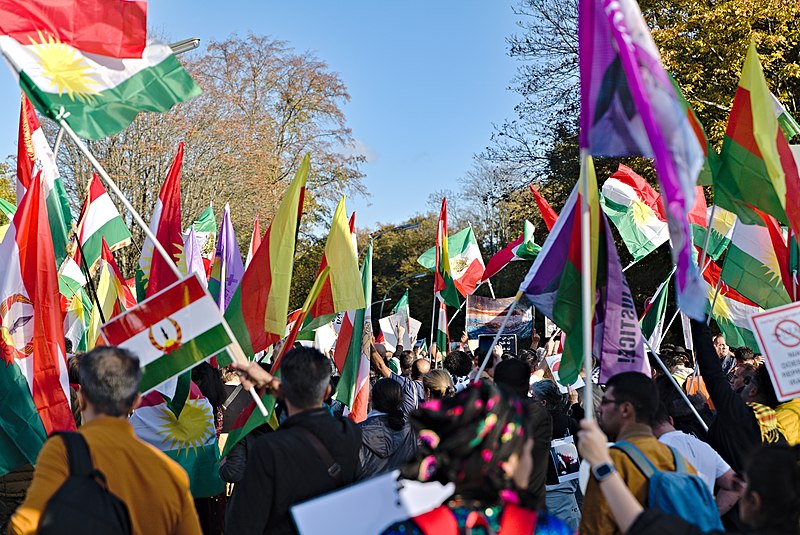Iranian authorities have sought to crack down on the widespread unrest that has taken place since September. Security forces ramped up their crackdown on protests in a Kurdish region, killing four, according to human rights groups.
Iranian security forces have ramped up their crackdown in the Kurdish region of Mahabad over the weekend. Rights groups, as well as posts circulating on social media, said that four people participating in the protests were killed. Videos that were taken and posted on social media showed military vehicles with heavily armed troops allegedly in the western city.
The Norway-based human rights group Hengaw said that military helicopters that had members of the Islamic Revolutionary Guards on board were deployed to further suppress the protests in the predominantly Sunni Muslim city. The rights group said at least four demonstrators were killed.
Iranian state media issued a statement which confirmed the plans by the IRGC in “strengthening” their forces in the northwestern Kurdish region to confront “terrorist separatist groups.”
Widespread protests were sparked in September following the death of Kurdish-Iranian woman Mahsa Amini in the custody of the Islamic Republic’s morality police. Amini died three days after her arrest over allegedly flouting the Islamic Republic’s dress code for women.
Tehran has blamed Amini’s death on pre-existing medical conditions, which Amini’s family and eyewitness accounts have refuted. Tehran has also sought to blame its foreign adversaries, especially the United States, for the unrest, accusing them of trying to destabilize the Islamic Republic.
Prominent Sunni Muslim cleric Molavi Abdolhamid, who has become a dissenting voice in the predominantly Shi’ite Muslim-ruled government, called on the security forces to stop opening fire at demonstrators in Mahabad.
Women and students have led the widespread protests in the biggest show of opposition to the country’s clerical rulers since the 1979 Revolution.
The Iranian World Cup team also signalled its support for the protests by refusing to sing the country’s national anthem. The refusal to sing the national anthem came amidst criticism from fans, accusing the team of siding with authorities.
The Iranian team, also known as Team Melli, has been speculated on whether they would use the World Cup as a platform to voice their support for the protesters.



 Pentagon Leaders Monitor U.S. Iran Operation from Mar-a-Lago
Pentagon Leaders Monitor U.S. Iran Operation from Mar-a-Lago  Israel Launches Fresh Strikes on Iran After Death of Supreme Leader Ayatollah Khamenei
Israel Launches Fresh Strikes on Iran After Death of Supreme Leader Ayatollah Khamenei  Pakistan-Afghanistan Tensions Escalate as Taliban Offer Talks After Airstrikes
Pakistan-Afghanistan Tensions Escalate as Taliban Offer Talks After Airstrikes  UK Accepts U.S. Request to Use British Bases for Defensive Strikes on Iranian Missiles
UK Accepts U.S. Request to Use British Bases for Defensive Strikes on Iranian Missiles  EU Urges Maximum Restraint in Iran Conflict Amid Fears of Regional Escalation and Oil Supply Disruption
EU Urges Maximum Restraint in Iran Conflict Amid Fears of Regional Escalation and Oil Supply Disruption  Trump Launches Operation Epic Fury: U.S. Strikes on Iran Mark High-Risk Shift in Middle East
Trump Launches Operation Epic Fury: U.S. Strikes on Iran Mark High-Risk Shift in Middle East  U.S.-Israel Strike on Iran Escalates Middle East Conflict, Trump Claims Khamenei Killed
U.S.-Israel Strike on Iran Escalates Middle East Conflict, Trump Claims Khamenei Killed  Middle East Conflict Escalates After Khamenei’s Death as U.S., Israel and Iran Exchange Strikes
Middle East Conflict Escalates After Khamenei’s Death as U.S., Israel and Iran Exchange Strikes  Trump Says U.S. Combat Operations in Iran Will Continue Until Objectives Are Met
Trump Says U.S. Combat Operations in Iran Will Continue Until Objectives Are Met  Pentagon to Halt Ivy League Programs for U.S. Military Officers Starting 2026
Pentagon to Halt Ivy League Programs for U.S. Military Officers Starting 2026  Germany and China Reaffirm Open Trade and Strategic Partnership in Landmark Beijing Visit
Germany and China Reaffirm Open Trade and Strategic Partnership in Landmark Beijing Visit  Argentina Senate Approves Bill to Lower Age of Criminal Responsibility to 14
Argentina Senate Approves Bill to Lower Age of Criminal Responsibility to 14  Zelenskiy Urges Change in Iran After U.S. and Israeli Strikes, Cites Drone Support for Russia
Zelenskiy Urges Change in Iran After U.S. and Israeli Strikes, Cites Drone Support for Russia  Trump Announces U.S. Strikes on Iran Navy as Conflict Escalates
Trump Announces U.S. Strikes on Iran Navy as Conflict Escalates  Russia Signals Openness to U.S. Security Guarantees for Ukraine at Geneva Peace Talks
Russia Signals Openness to U.S. Security Guarantees for Ukraine at Geneva Peace Talks  Macron Urges Emergency UN Security Council Meeting as US-Israel Strikes on Iran Escalate Middle East Tensions
Macron Urges Emergency UN Security Council Meeting as US-Israel Strikes on Iran Escalate Middle East Tensions  Trump Warns Iran as Gulf Conflict Disrupts Oil Markets and Global Trade
Trump Warns Iran as Gulf Conflict Disrupts Oil Markets and Global Trade 































